- Home
- Tad Williams
The War of the Flowers Page 9
The War of the Flowers Read online
Page 9
The hungry thing paused to make repairs. There was much hard, physical travel to do now that it had become a part of this plane of existence, and the body must hold up for a long journey. This stolen vehicle must also be strong enough to capture the theovilmos thing and to carry it away to the dark places, as had been ordained.
But perhaps, it thought in its wordless way, when the ones who had summoned the disease spirit were done with the theovilmos, they would let the irrha feed on it. That would be a very pleasurable hour, when hunger was at last filled.
7 WOODS
After such exhausting researches (and after so many failed attempts!) to behold at last that fabled metropolis standing before me, the teeming streets and the shining towers that so few men have seen, and fewer still have returned from, was to understand once and for all that Science is a sham and what we call "human knowledge" a compendium of evasions and half-truths. As I stared at this breathtaking vista, even without knowing what would happen to me — and perhaps the gods or Fate blessed me by that ignorance — I understood that my life had now changed so completely that all of the experience I had so eagerly sought, in so many unusual corners of the world and among so many odd people and situations, had served only as a brief, shadowy prelude to this moment . . .
It seemed like a good place to pause. Theo wrapped the book in a towel and then placed it carefully in his backpack, having decided it would be better to take it in the car than to risk it getting smashed up in a box among the rest of his things. Of the small stock of possessions he was moving to the cabin, it was the only thing that could not be replaced.
While his great-uncle's story had grown more and more unlikely, Theo's respect for it as a tale well-told had grown too. While it would never be classed as a great work of fiction, or even a particularly good one — the rhetoric tended toward the florid, for one thing, heavily influenced by the pulps Eamonn Dowd had read in his youth, and it also seemed far more like a travelogue than a novel, unimportant incidents often given the same weight and detail as far more meaningful events — he had to admit that it was a pretty good book of its sort. Despite the purposeful obfuscations (the "but of that I will not speak more" bullshit, as Theo thought of it) picked up from too much Lovecraft or whoever, the protagonist's unrelenting search for some way to reach the mysterious, magical city had been genuinely entertaining. Theo was interested to see whether the fictional city, now that the protagonist had found the arcane wisdom to make his way there, would live up to the buildup — in other words, would Great-Uncle Eamonn turn out to be a real writer or just an amateur trying to spice up his own interesting but unmagical recollections with things stolen from Weird Tales?
In fact, since he now had about two hundred thousand dollars from the sale of his mother's house stashed in the bank — a reassuringly boring bank on a main street, with lots of tellers inside and ATMs on the outside walls, nothing at all like Eamonn Dowd's choice of a financial institution — Theo could afford not only to finish reading the book at leisure, but also to toy with the idea of having it published. Even living in as expensive a place as the Bay Area, two hundred thousand would keep him going for a few years. He supposed he might use the money instead as a down payment on a house of his own, but then he'd need another source of income to get a home loan, and by itself the money left over after his mother's mortgages and other debts were paid off wasn't enough to buy anything bigger than a Boy Scout tent within driving distance of the city. No, better to rent, to live off at least some of the proceeds while he figured out how he was going to get his train wreck life off the siding and back onto the tracks again.
So since he had a little money, why not publish his great-uncle's book? It was unlikely a real publisher would want it, but surely a thousand dollars or so could get him a nice little print run from a vanity press. He could even dedicate it to his mother, give a few copies to local libraries. It wouldn't exactly rescue Anna Vilmos from obscurity, but it would be something.
He looked around her tidy, anonymous living room for the last time — her truest legacy, now about to pass into the hands of some young couple she'd never met. He owed her something, didn't he?
She said she never loved me properly. But did that mean he should feel bad, or be proud of her because she'd done as well as she could, proud of himself because he'd still turned out halfway decent? Maybe not a success, but not a criminal or a wife-beater, either. Mom had done her best. Maybe some people just shouldn't be parents, he thought.
That beckoned him down some unpleasant paths. He picked up the backpack instead and carried it out to his car and the rented trailer that held his motorcycle.
Good-bye, house. Can't say I'll miss you much. Now another family would move in — the Marshalls, or whatever their name had been — and begin their own lives here. It wasn't anything to do with him any more. It should feel different than this, shouldn't it? But then again, if there had been any real memories left here — any good ones, that was — it would. He had enough of his mother's final weeks to last a lifetime. It had been another excellent reason to sell the place, more compelling even than the money.
I never really felt at home even in the old house, he thought. Or when I lived with Cat. So what's wrong with me? He climbed behind the wheel and began to back the trailer down the driveway and out into the street, turning the wheel hard to avoid taking the fender off a pickup truck that some idiot had parked a full yard and a half away from the curb. Mrs. Kraley had come out to her fence to watch him go, the hose's spray making a rainbow in the air next to her impassive face. He waved to her cheerfully, just for old time's sake. She didn't disappoint him by waving back.
————— Theo drove slowly down Highway 280, and not only because of the awkwardness of the trailer behind his mother's small, underpowered car. It was a beautiful late summer day at the end of the millennium, after all, and he was tired of listening to himself bitch. It might be nice to savor the moment a bit, instead. Things were a bit bleak, sure, but if he looked at it the right way, he could decide he had finally reached that oh-so-elusive bottom and was about to start climbing back up. He would have felt more certain about it with an attractive, intelligent woman in the passenger seat, sharing his new start, but as Mick and Keith had so accurately stated, you couldn't always get what you wanted.
Fifteen miles south of San Francisco he saw the first watch-out-for-deer sign, a leaping black silhouette of a stag blazoned on the yellow diamond like a medieval coat of arms. It gave him a genuinely good feeling, even though he knew from friends that most of the people who lived in the Santa Cruz Mountains thought of their local deer as something like big rats, destroying gardens and trampling newly sodded lawns.
Theo didn't care. The idea of living somewhere that wild deer lived was exciting, and he certainly wasn't going to be planting a lawn. He turned up the car radio and punched buttons until he found something loud and thumpingly exultant, some piece of jolly stupidity from AC/DC. On his right, combs of fog curled across the mountaintop like white claws, wet air from the ocean turning to mist as it passed over the cold crest, but the sky above the freeway was cloudless and the road was vivid with sunshine.
————— It was funny how the day seemed to wither away as you drove up into the hills, as though the time was somehow different here in the grip of the mountains. The clock in the dashboard of his mother's Toyota said it was still only 3:30, and there were stretches of road where the sky flared bright blue overhead, but in the shadows of the trees it seemed almost twilight.
He had only been to the cabin once before, on the day the real estate agent had shown it to him, and the smaller roads on either side of Skyline were often poorly marked. He made the exact same mistake he had made coming for the first visit, mistaking one winding road for another, but recovered much more quickly this time — the first error had left him completely lost and he had been forced to call the agent and let her guide him back to the right road by cell phone, a process apparently as difficult as re
mote brain surgery.
He was over the top and onto the coast side of the mountains before four o'clock, although he was still far removed from any views of the ocean as he turned off a narrow, meandering road named Mariposa and onto the unmarked strip of alligatored asphalt that served as a private driveway for the cabin and two or three other houses scattered back in the woods among the redwoods, firs, and red-skinned manzanita. The sun was still above the tree line, but as he reached the end of the drive it was blocked by a tall stand of evergreens behind the cabin that left it and the bumpy, weedcluttered yard plunged in shadow and for a moment made Theo regret his decision. He stopped the car and got out, stood listening to the silence, the flat, unanswered echo of the car door closing.
It's what you wanted, right? No distractions. A place to think about things, to put things back together. The key was hung on a nail as the realtor had promised, tucked out of sight on the rickety fence that pointlessly separated the overgrown chaos of the cabin's front yard from the overgrown chaos of the back, a tangle of weeds and grasses on all sides that flowed smoothly away into the trees and continued largely unabated to the hillcrest and beyond — right out to the ocean, for all he knew. It was weird to have left his mother's trim, orderly neighborhood a short while ago and find himself here, with no neighbors he could see or even hear unless they took it on themselves to start shooting off machine guns in their backyards.
He'd heard there actually were people like that up here in the mountains. Theo could only hope it was more the exception than the rule. It had taken him nearly half an hour to drive from Skyline, the main road. How long would it take police or an ambulance to get here?
You wanted it, man. He could almost hear Johnny's voice. Shit, stop whining. The inside of the cabin raised his spirits a little. It was small, really just one room plus a small bathroom and smaller closet, but as nicely appointed as he remembered it, with an efficient little kitchen area, a stone fireplace, and polished wood floors everywhere except the sunken, carpeted area in the center of the room. No television, and he doubted that the small one he had brought from his mother's would get much in the way of reception out here with its tiny little aerial, but if he really started to get desperate he could always get a satellite dish. He had a one-year lease, which meant he had plenty of time to figure out what he did and did not need, in lots of different ways.
The bed was on a platform raised more than head-high in one corner of the room, almost a little separate loft with its own built-in ladder, leaving room underneath it for a bookcase and a comfortable-looking armchair, both of which the absentee owner had preferred to leave in the cabin. Theo had been happy to accept. One of the large windows displayed a tangle of trees just outside and looked like it would get good sunshine during the middle of the day. He had a brief, cheerful vision of himself sitting there, reading Moby-Dick or something else he'd been promising himself he'd get to for years — what was that Pynchon book that Cat had kept bugging him about? Crying in Lot 49, something like that? Hell, why not? He'd read that too. A couple of trips a week down to the flats to get groceries, occasional stops at the bookstore. He'd read, play guitar, maybe get back to writing songs again like Johnny had suggested. Take long motorcycle rides through the hills, cruise down to the beach now and then or even up the coast all the way to San Francisco, just to fill up the culture tanks a bit. Take it all real slow. Think about what he'd lost over the last few years and where he might find it again.
Feeling better, he started carrying boxes in from the car. It has many names, this fabled metropolis — Avallone, Cibola, Tír na nOg, to mention but a few, and doubtless dozens more I never heard, because I spoke only the common language of the place (of which I shall say more later) although there are many other tongues also spoken there. I myself named it New Erewhon, after Samuel Butler's famous creation, but that was only a human conceit (as I suspect is true with the other names as well). Its inhabitants, and those who live in the vast countryside that surrounds it, call it only "the City," because it is the only one, and dominates all around it as no earthly city ever could . . .
Theo was intrigued. This was the first direct admission in Eamonn Dowd's story that the mythical land of which he had said so much, and in such glowing but guarded terms, was not to be found in some removed but still terrestrial location, like Shangri La or El Dorado, but was all the way . . . out there.
Avallone. That's King Arthur or something, isn't it? But Arthur only went there after he died, sort of. So is that Road that Uncle Eamonn's always going on about supposed to be, like, just a metaphor or something? And the Last Gate, too? Some kind of magical passage to fairyland? I suppose I should have guessed, since they were always capitalized.
Before I speak of the inhabitants, I should tell more of New Erewhon itself, although no words — at least no words of mine — can ever truly describe its strangeness and beauty. It rises out of a ring of thickly wooded hills, a forest that surrounds the city like a moat. That great wood, which despite its spread can be circumnavigated far more quickly than it can be crossed, so deceptive are the distances beneath the trees, is called True Arden by some, but I have heard it called the Forest Sauvage and Oldheart and the Murkwood as well.
I did not know at first whether this meant that the multiplicity of names came from the different types of magical folk that inhabit the City and its surroundings, or whether the names came originally from earthly dreamers, who somehow influenced the land's true residents. In fact, the mechanism that allowed me to speak the common language is itself quite mysterious. After having spent much time there, and learned more than most thought I would, I suspect I know the answer, but will not spend the time here to publish my speculations because they are complicated and strange.
The City itself is formed in a huge spiral like a monstrous nautilus shell, but this makes it sound simpler than it really is. The coil is crisscrossed by thousands of alleys and side streets, and all the unplanned building over the years — for instance, all through the outer rings, especially in the Morning Sky and Sunrise districts, the goblins have simply affixed their crude houses and shops like termite nests to the walls of older and more refined structures, creating a maze of tiny alleys and one-way streets — has long since broken up any chance of an uninterrupted spiral passage from the outermost rim of the City to its innermost point, which was off-limits to one such as I, in any case. But the shape still exerts an influence: the most ordinary parts of the City (or at least, what to my mortal eyes were the most familiar-seeming) are on the outskirts. As one moves closer to the center, not only do wealth and power create an increasingly intense atmosphere of their own, but there is also a more subtle alteration, as though each step toward the heart of the metropolis is also a step into something not quite definable — a magical pressure, for lack of a better word. Inside the innermost districts the families are rich and mad, but even that does not explain the volatility of experience there. And in the City's shrouded heart (a piece of remaining forest referred to as the Grove or sometimes the Cathedral, where almost no one goes, and certainly an outsider like me is not welcome) it is reported that the warping of earthly time, which begins from the moment one passes the Last Gate, is at its most powerful, and is no longer simply different than earthly time, but becomes a more plastic medium altogether . . .
Theo shut the book. As though himself affected by his great-uncle's timewarpage idea, he was reading more slowly as the story grew stranger and stranger. A week in the cabin and he still hadn't looked at any other books, caught up in the puzzles and fascinating invention of Eamonn Dowd's creation. He hadn't spent as much time as he'd promised himself playing his guitar either. The days had been unexpectedly full, for one thing — despite the guarantees of the real estate agents that everything would be ready for him, it had taken him half the week and several calls to the owner's management company just to get the cabin's plumbing and electricity working properly, so the long leisurely stretches of nothing to do but read and think we
re still largely theoretical.
He also wasn't sleeping that well. The creepy dreams, especially the ones in which he felt he was someone other than himself, or rather that he was somehow sharing himself against his will, still kept coming back like a foul odor. They didn't show up every night, thank God, but often enough to make him wonder if he needed to think about Prozac or something.
All the luckier, then, that he had the matter of his great-uncle's book to help occupy his thoughts. As far as he could make sense of it, the story's protagonist was definitely supposed to have traveled not just to some backwater place in the real world, but through some sort of magical barrier — a process described at great but unenlightening length, with even the few grudging bits of specificity couched in terms Theo did not understand, full of references to books or other writings and their authors which might be completely fictional as far as he could tell. Eamonn Dowd's invented world itself seemed to be in some ways a standard Fairyland, but it was neither the butterflies-and-flowers place of children's tales nor even the glamorous, perilous land of Celtic and Scandinavian mythology. Instead, from what Theo had read so far, it seemed like a bizarre mirror-version of the real world, albeit in a slightly old-fashioned way. Already there had been references to office buildings and railway lines. What kind of fairyland had railroads, for God's sake?
It was original, at least — he had to give his great-uncle credit for that. Maybe he really could find a legitimate publisher. In some ways the City's organization is unsurprising. The powerful families tend to draw their less powerful supporters close, so that a given neighborhood might belong almost exclusively to the adherents of the Starwort or Marigold clans (to name just two of the lesser High Houses.) These neighborhoods have become virtually selfsufficient towns within the greater city, centered around the towers of the leading families. In a way, I suppose, it is a bit like Florence of the Quattrocento, where nearly everyone found his or her allegiance with one of the leading family tribes, the Pazzi, Albizzi, or Medici.

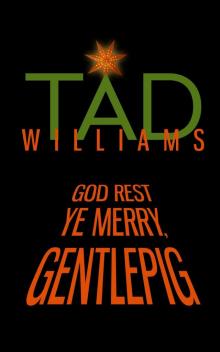 God Rest Ye Merry, Gentlepig
God Rest Ye Merry, Gentlepig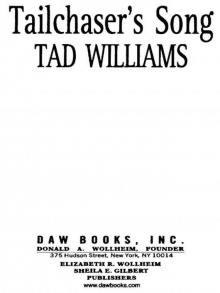 Tailchaser's Song
Tailchaser's Song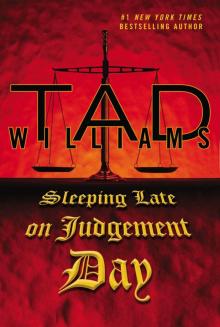 Sleeping Late on Judgement Day
Sleeping Late on Judgement Day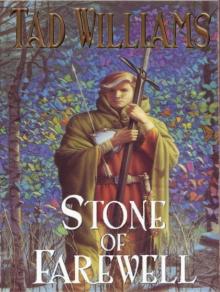 Stone of Farewell
Stone of Farewell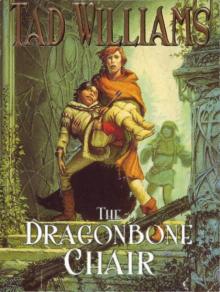 The Dragonbone Chair
The Dragonbone Chair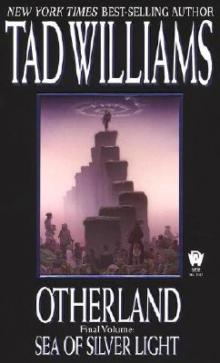 Sea of Silver Light
Sea of Silver Light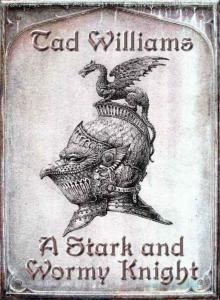 A Stark and Wormy Knight
A Stark and Wormy Knight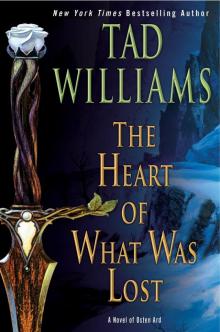 The Heart of What Was Lost
The Heart of What Was Lost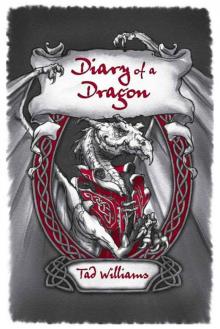 Diary of a Dragon
Diary of a Dragon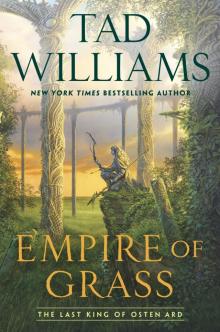 Last King of Osten Ard 02 - Empire of Grass
Last King of Osten Ard 02 - Empire of Grass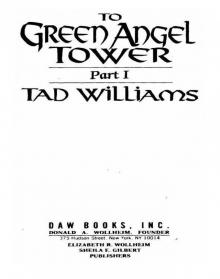 To Green Angel Tower, Volume 1
To Green Angel Tower, Volume 1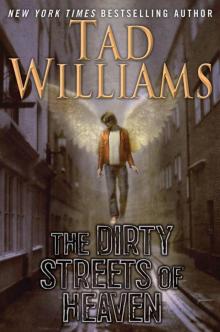 The Dirty Streets of Heaven
The Dirty Streets of Heaven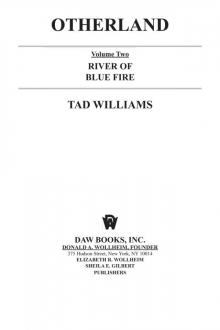 River of Blue Fire
River of Blue Fire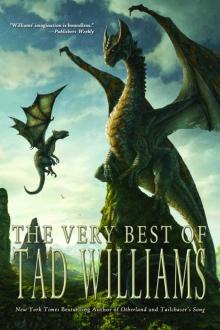 The Very Best of Tad Williams
The Very Best of Tad Williams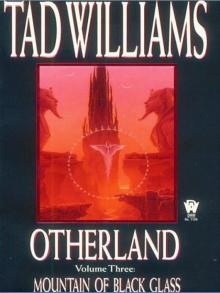 Mountain of Black Glass
Mountain of Black Glass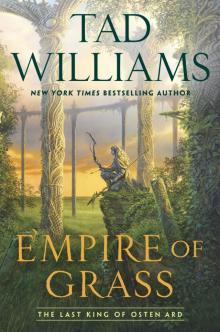 Empire of Grass
Empire of Grass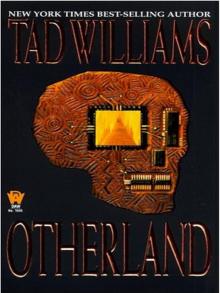 City of Golden Shadow
City of Golden Shadow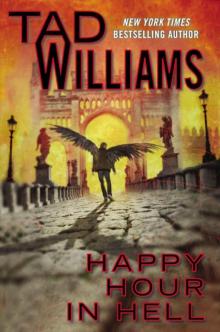 Happy Hour in Hell
Happy Hour in Hell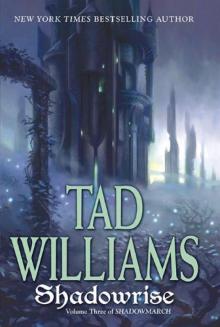 Shadowrise
Shadowrise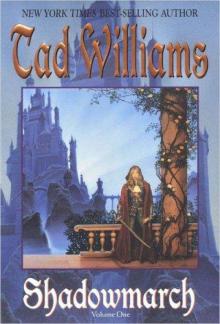 Shadowmarch
Shadowmarch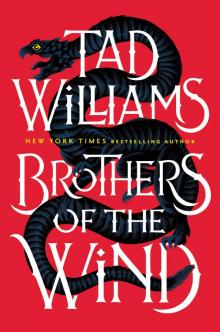 Brothers of the Wind
Brothers of the Wind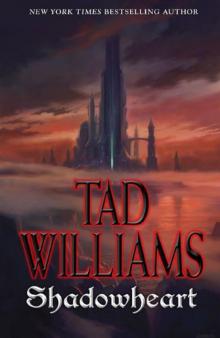 Shadowheart
Shadowheart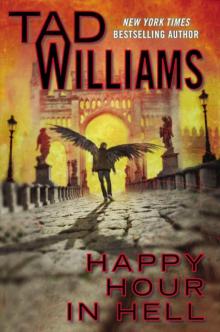 Bobby Dollar 02 - Happy Hour In Hell
Bobby Dollar 02 - Happy Hour In Hell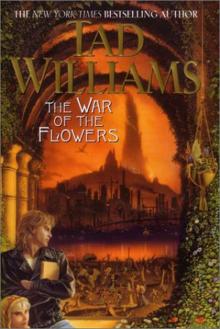 The War of the Flowers
The War of the Flowers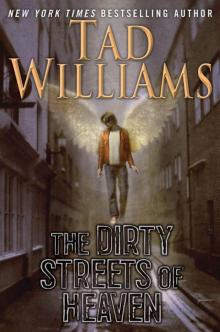 The Dirty Streets of Heaven bd-1
The Dirty Streets of Heaven bd-1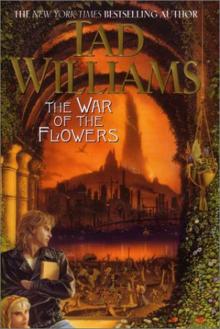 Tad Williams - The War of the Flowers (retail) (pdf)
Tad Williams - The War of the Flowers (retail) (pdf)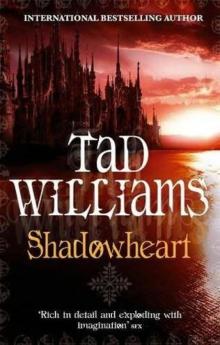 Shadowheart s-4
Shadowheart s-4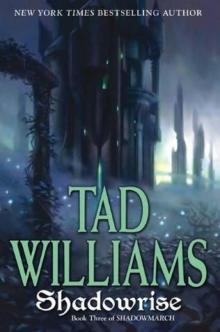 Shadowrise s-3
Shadowrise s-3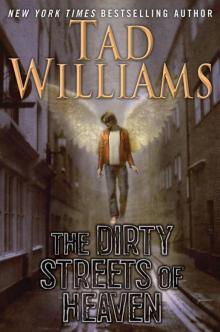 The Dirty Streets of Heaven: Volume One of Bobby Dollar
The Dirty Streets of Heaven: Volume One of Bobby Dollar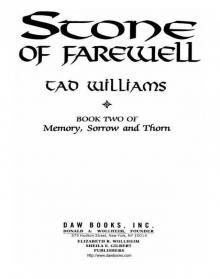 The Stone of Farewell
The Stone of Farewell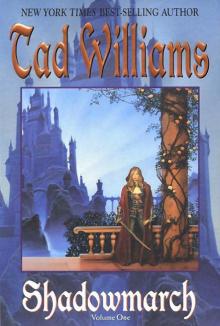 (Shadowmarch #1) Shadowmarch
(Shadowmarch #1) Shadowmarch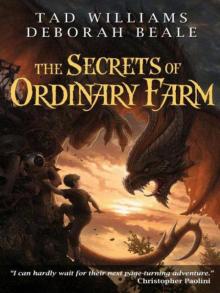 The Secrets of Ordinary Farm of-2
The Secrets of Ordinary Farm of-2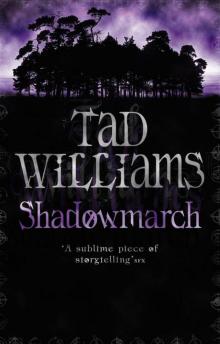 Shadowmarch s-1
Shadowmarch s-1![Bobby Dollar [04] God Rest Ye Merry, Gentlepig Read online](http://i1.bookreadfree.com/i1/04/06/bobby_dollar_04_god_rest_ye_merry_gentlepig_preview.jpg) Bobby Dollar [04] God Rest Ye Merry, Gentlepig
Bobby Dollar [04] God Rest Ye Merry, Gentlepig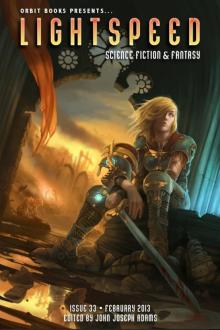 Lightspeed Issue 33
Lightspeed Issue 33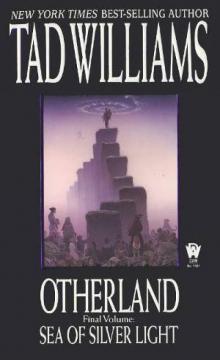 Sea of Silver Light o-4
Sea of Silver Light o-4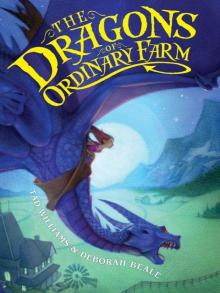 The Dragons of Ordinary Farm of-1
The Dragons of Ordinary Farm of-1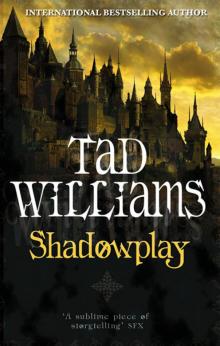 Shadowplay s-2
Shadowplay s-2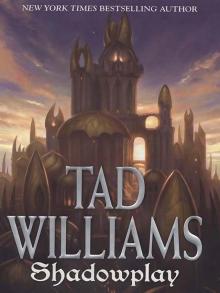 (Shadowmarch #2) Shadowplay
(Shadowmarch #2) Shadowplay